IPhO2014-第45届国际物理奥林匹克竞赛理论试题与解答
国际物理林匹克竞赛试题25th_IPhO_1994

THE EXAMINATIONXXV INTERNATIONAL PHYSICS OLYMPIADBEIJING, PERPLE’S REPUBLIC CHINATHEORETICAL COMPETITIONJuly 13, 1994Time available: 5 hoursREAD THIS FIRST!INSTRUCTIONS:1. Use only the ball pen provided.2. Your graphs should be drawn on the answer sheets attached to the problem.3. Your solutions should be written on the sheets of paper attached to the problems.4. Write at the top of the first page of each problem:●The total number of pages in your solution to the problem●Your name and code numberTheoretical Problem 1RELATIVISTIC PARTICLEIn the theory of special relativity the relation between energy E and momentum P or a free particle with rest mass m 0 is242022mc c m c p E =+=When such a particle is subject to a conservative force, the total energy of the particle, which is the sum of42022c m c p + and the potential energy, is conserved. Ifthe energy of the particle is very high, the rest energy of the particle can be ignored (such a particle is called an ultra relativistic particle).1) consider the one dimensional motion of a very high energy particle (in which rest energy can be neglected) subject to an attractive central force of constant magnitude f . Suppose the particle is located at the centre of force with initial momentum p 0 at time t =0. Describe the motion of the particle by separately plotting, for at least one period of the motion: x against time t , and momentum p against space coordinate x . Specify the coordinates of the “turning points ” in terms of given parameters p 0 and f . Indicate, with arrows, the direction of the progress of the mothon in the (p , x ) diagram. There may be short intervals of time during which the particle is not ultrarelativistic. However, these should be neglected.Use Answer Sheet 1.2) A meson is a particle made up of two quarks. The rest mass M of the meson is equal to the total energy of the two-quark system divided by c 2.Consider a one--dimensional model for a meson at rest, in which the two quarks are assumed to move along the x -axis and attract each other with a force of constant magnitude f It is assumed they can pass through each other freely. For analysis of the high energy motion of the quarks the rest mass of the quarks can be neglected. At time t=0 the two quarks are both at x =0. Show separately the motion of the two quarks graphically by a (x , t ) diagram and a (p , x ) diagram, specify the coordinates of the “turning points ” in terms of M and f , indicate the direction of the process in your (p , x ) diagram, and determine the maximum distance between the two quarks. Use Answer Sheet 2.3) The reference frame used in part 2 will be referred to as frame S , the Lab frame, referred to as S , moves in the negative x -direction with a constant velocity v =0.6c . the coordinates in the two reference frames are so chosen that the pointx =0 in S coincides with the point 0='x in S '' at time 0='=t t . Plot the motion of the two quarks graphically in a (x ', t ') diagram. Specify the coordinates of the turning points in terms of M , f and c , and determine the maximum distance between the two quarks observed in Lab frame S '. Use Answer Sheet 3.The coordinates of particle observed in reference frames S and S '' are related by the Lorentz transformation⎪⎩⎪⎨⎧+='+=')()(c x t t ct x x βγβγwhere c v /=β,21/1βγ-= and v is the velocity of frame S moving relative to the frame S ''.4) For a meson with rest energy Mc 2=140 MeV and velocity 0.60c relative to theLab frame S '', determine its energy E ' in the Lab Frame S ''.ANSWER SHEET 1 ANSWER SHEET 2 1)2)OOtOxptx 1, x 2Ox 1p 1 Ox 2p 2Quark1Quark2The maximum distance betweenthe two quarks is d =ANSWER SHEET 3 3)Theoretical Problem 1—Solution1) 1a. Taking the force center as the origin of the space coordinate x and the zero potential point, the potential energy of the particle is||)(x f x U =(1)The total energy is||42022x f c m c p W ++=.1b. Neglecting the rest energy, we get||||x f c p W +=,(2)Since W is conserved throughout the motion, so we havec p x f c p W 0||||=+=,(3)Let the x axis be in the direction of the initial momentum of the particle,cp fx pc c p fx pc c p fx pc cp fx pc 0000=--=-=+-=+⎪⎪⎭⎪⎪⎬⎫<<><<>>>.0,0;0,0;0,0;0,0p x p x p x p x (4)The maximum distance of the particle from the origin, let it be L , corresponds to p =0. It isf c p L /0=.1c. From Eq. 3 and Newton ’s law⎩⎨⎧<>-==;0,;0,x f x f F dt dp(5)we can get the speed of the particle asc dtdp f c dt dx ==, (6)tx 1′, x 2′OThe maximum distance between the two quarks observed in S ′frame is d ′=when when when wheni.e. the particle with very high energy always moves with the speed of light except that it is in the region extremely close to the points L x ±=. The time for the particle to move from origin to the point L x =, let it be denoted by τ, isf p c L //0==τ.So the particle moves to and for between L x = and L x -= with speed c and periodf p /440=τ. The relation between x and t is⎪⎪⎭⎪⎪⎬⎫≤≤-=≤≤-=≤≤-=≤≤=,43,4,32,2,2,20,τττττττt L ct x t ct L x t ct L x t ct x(7)The required answer is thus as given in Fig. 1 and Fig. 2.Fig. 12) The total energy of the two-quark system can be expressed as||||||21212x x f c p c p Mc -++=,(8)where 1x ,2x are the position coordinates and 1p , 2p are the momenta of quark 1 and quark 2 respectively. For the rest meson, the total momentum of the two quarks is zero and the two quarks move symmetrically in opposite directions, we have021=+=p p p , 21p p -=, 21x x -=.(9)Let p 0 denote the momentum of the quark 1 when it is at x =0, then we havec p Mc 022=or2/0Mc p =(10)From Eq. 8, 9 and 10, the half of the total energy can be expressed in terms of 1p and1x of quark 1:||||110x f c p c p +=,(11)just as though it is a one particle problem as in part 1 (Eq. 3) with initial momentumL= p 0/fc/f2/0Mc p =. From the answer in part 1 we get the (x , t ) diagram and (p , x ) diagram of the motion of quark 1 as shown in Figs. 3 and 4. For quark 2 the situation is similar except that the signs are reversed for both x and p ; its (x , t ) and (p , x ) diagrams are shown in Figs. 3 and 4.The maximum distance between the two quarks as seen from Fig. 3 isf Mc f c p L d //2220===. (12)Fig. 3Fig. 4a Quark1 Fig. 4bQuark23) The reference frame S moves with a constant velocity V =0.6c relative to the Lab frame S '' in the x ' axis direction, and the origins of the two frames are coincident at the beginning (0='=t t ). The Lorentz transformation between these two frames is given by:),/(),(c x t t ct x x βγβγ+='+='(13)where c V /=β, and 21/1βγ-=. With c V 6.0=, we have 5/3=β, and4/5=γ. Since the Lorenta transformation is linear, a straight line in the (x , t ) diagram2L=Mc 2/2fx 1: solid linetransforms into a straight line the (x ', t ') diagram, thus we need only to calculate the coordinates of the turning points in the frame S '.For quark 1, the coordinates of the turning points in the frames S and S ' are as follows:Frame SFrame S ' 1x 1t)(111ct x x βγ+=' )/(111e x t t βγ+=' 114345ct x +=c x t /434511+= 0 0 0L τL L 2)1(=+βγ ττβγ2)1(=+τ2L L 232=γβτγτ252=L - τ3 L L =-)13(βγττβγ3)3(=-0 τ4L L 34=γβτγτ54=where f Mc f c p L 2//20==, f Mc f p 2//0==τ.For quark 2, we have Frame SFrame S ' 2x 2t)(222ct x x βγ+=' )/(222c x t t βγ+=' 224345ct x +=c x t /434522+= 0 0 0L - τL L 21)1(-=--βγττβγ21)1(=-τ2 L L 232=γβτγτ252=L τ3 L L 27)13(=+βγττβγ29)3(=+τ4L L 34=γβτγτ54=With the above results, the (x ', t ') diagrams of the two quarks are shown in Fig. 5.The equations of the straight lines OA and OB are:t c t x '='')(1; ττβγ2)1(0=+≤'≤t ; (14a) t c t x '-='')(2;ττβγ21)1(0=-≤'≤t(14b)The distance between the two quarks attains its maximum d ' when τ21='t , thus wehave maximum distancefMc L c d 2)1(2)1(22=-=-='βγτβγ. (15)Fig. 54) It is given the meson moves with velocity V =0.6 crelative to the Lab frame, its energy measured in the Lab frame is1751408.01122=⨯=-='βMc E MeV . Grading SchemePart 1 2 points, distributed as follows:0.4 point for the shape of x (t ) in Fig. 1; 0.3 point for 4 equal intervals in Fig. 1; (0.3 for correct derivation of the formula only)0.1 each for the coordinates of the turning points A and C , 0.4 point in total; 0.4 point for the shape of p (x ) in fig. 2; (0.2 for correct derivation only)0.1 each for specification of 0p , f c p L /0=, 0p -, L - and arrows, 0.5 pointin total.(0.05 each for correct calculations of coordinate of turning points only).Part 2 4 points, distributed as follows:0.6 each for the shape of )(1t x and )(2t x , 1.2 points in total;0.1 each for the coordinates of the turning points A, B, D and E in Fig. 3, 0.8 pointin total;0.3 each for the shape of )(11x p and )(22x p , 0.6 point in total;0.1 each for 2/0Mc p =, f Mc L 2/2=, 0p -, L - and arrows in Fig. 4a andFig. 4b, 1 point in total; 0.4 point for f Mc d /2=Part 3 3 point, distributed as follows:0.8 each for the shape of )(1t x '' and )(2t x '', 1.6 points in total; 0.1 each for the coordinates of the turning points A, B, D and E in Fig. 5, 0.8 pointin total; (0.05 each for correct calculations of coordinate of turning points only).0.6 point for f Mc d 2/2='.Part 4 1 point (0.5 point for the calculation formula; 0.5 point for the numerical valueand units)Theoretical Problem 2SUPERCONDUCTING MAGNETSuper conducting magnets are widely used in laboratories. The most common form of super conducting magnets is a solenoid made of super conducting wire. The wonderful thing about a superconducting magnet is that it produces high magnetic fields without any energy dissipation due to Joule heating, since the electrical resistance of the superconducting wire becomes zero when the magnet is immersed in liquid helium at a temperature of 4.2 K. Usually, the magnet is provided with a specially designed superconducting switch, as shown in Fig. 1. The resistance r of the switch can be controlled: either r =0 in the superconducting state, or n r r = in the normal state. When the persistent mode, with a current circulating through the magnet and superconducting switch indefinitely. The persistent mode allows a steady magnetic field to be maintained for long periods with the external source cut off.The details of the superconducting switch are not given in Fig. 1. It is usually a small length of superconducting wire wrapped with a heater wire and suitably thermally insulated from the liquid helium bath. On being heated, the temperature of the superconducting wire increases and it reverts to the resistive normal state. The typical value of n r is a few ohms. Here we assume it to be 5Ω. The inductance of a superconducting magnet depends on its size; assume it be 10 H for the magnet in Fig. 1. The total current I can be changed by adjusting the resistance R . This problem will be graded by the plots only!The arrows denote the positive direction of I , I 1 and I 2.Fig. 11) If the total current I and the resistance r of the superconducting switch are controlledto vary with time in the way shown in Figs, 2a and 2b respectively, and assuming the currents I 1 and I 2 flowing through the magnet and the switch respectively are equal at the beginning (Fig. 2c and Fig. 2d), how do they vary with time from t 1 to t 4? Plot your answer in Fig. 2c and Fig. 2d2) Suppose the power switch K is turned on at time t =0 when r =0, I 1=0 and R =7.5Ω, and the total current I is 0.5A. With K kept closed, the resistance r of the superconducting switch is varied in he way shown in Fig. 3b. Plot the corresponding time dependences of I , I 1 and I 2in Figs. 3a, 3c and 3d respectively.3) Only small currents, less than 0.5A, are allowed to flow through theFig.2a2b 2c 2dFig. 3a3b 3c 3dsuperconducting switch when it is in the normal state, with larger currents the switch will be burnt out. Suppose the superconducting magnet is operated in a persistent mode, i. e. I =0, and I 1=i 1(e. g. 20A), I 2=-i 1, as shown in Fig. 4, from t =0 to t =3min. If the experiment is to be stopped by reducting the current through the magnet to zero, how would you do it? This has to be done in several operation steps. Plot the corresponding changes of I , r , I 1 and I 2in Fig. 44) Suppose the magnet is operated in a persistent mode with a persistent current of 20A (t =0 to t =3min. See Fig. 5). How would you change it to a persistent mode with acurrent of 30a? plot your answer in Fig. 5.Fig. 4a4b 4c 4dFig. 5a5b 5cTheoretical Problem 2—Solution 1) For t =t 1 to t 3Since 0=r , the voltage across the magnet dt LdI V M /1==0, therefore,011121)(I t I I ==; 01221I I I I I -=-=.For t =t 3 to t 4Since I 2=0 at t =t 3, and I is kept at 021I after3t t =, 02==n M r I V , therefore, 1I and 2I will not change.0121I I =; 02=IThese results are shown in Fig. 6.5dFig. 6a6b 6c 6d2) For 0=t to 1=t min: Since 0=r , 0/1==dt LdI V M0)0(11==I I5.012=-=I I I A.At 1=t min, r suddenly jumps from O to n r , I will drop from R E / to)/(n r R E + instantaneously, because 1I can not change abruptly due to the inductance of the magnet coil. For R E /=0.5A, Ω=5.7R and Ω=5n R . I will drop to 0.3A. For 1=t min to 2 min:I , 1I and 2I gradually approach their steady values:5.0==REI A, 5.01==I I A 02=I .The time constantnn Rr r R L )(+=τ. When 10=L H, Ω=5.7R and Ω=5n r , 3=τsec. For 2=t min to 3 min:Since 0=r , 1I and 2I will not change, that is5.01=I A and 02=IFig. 7a7b3) The operation steps are: First stepTurn on power switch K , and increase the total current I to 20 A, i. e. equal to 1I .Since the superconducting switch is in the state 0=r , so that L V M = 0/1=dt dI , that is, 1I can not change and 2I increases by 20A, in other words, 2I changes from 20- A to zero. Second stepSwitch r from 0 to n r . Third stepGradually reduce I to zero while keeping 5.02<I A: since n M r V I /2= anddt dI L V m /1=, when 10=L H, Ω=5n r , the requirement 5.02<I A corresponds to 25.0/1<dt dI A/sec, that is, a drop of <15A in 1 min. In Fig. 8 dt dI /~0.1A/sec and dt dI /1 is around this value too, so the requirement has been fulfilled. Final stepSwitch r to zero when 0=M V and turn off the power switch K . These resultsare shown in Fig. 8.7c 7dFig. 8a8b 8c4) First step and second step are the same as that in part 3, resulting in 02=I .Third step Increase I by 10 A to 30 A with a rate subject to the requirement5.02<I A. Fourth step Switch r to zero when 0=M V .Fifth step Reduce I to zero, 301=I A will not change because M V is zero.12I I I -= will change to 30- A. The current flowing through the magnet is thus closed by the superconducting switch. Final step Turn off the power switch K . The magnet is operating in the persistent mode.These results are shown in Fig. 9.Grading SchemePart 1,2 points:0.5 point for each of 1I , 2I from 1t t = to 3t and 1I , 2I from 3t t = to 4t .Part 2,3 points:0.3 point for each of 1I , 2I from 0=t to 1 min, I , 1I , 2I at 1=t min,8dFig. 9a9b 9c 9dand 0I , 1I , 2I from 1=t to 2 min;0.2 point for each of I , 1I , and 2I from 2=t to 3 min. Part 3, 2 points: 0.25 point for each section in Fig. 8 from 3=t to 9 min, 8 sections in total. Part 4,3 points:0.25 point for each section in Fig. 9 from 3=t to 12 min, 12 sections in total.Theoretical Problem 3COLLISION OF DISCS WITH SURFACE FRICTIONA homogeneous disc A of mass m and radius R A moves translationally on a smoothhorizontal x -y plane in the x direction with a velocity V (see the figure on the next page). The center of the disk is at a distance b from the x-axis. It collides with a stationary homogeneous disc B whose center is initially located at the origin of the coordinate system. The disc B has the same mass and the same thickness as A, but its radius is R B . It is assumed that the velocities of the discs at their point of contact, in the direction perpendicular to the line joining their centers, are equal after the collision. It is also assumed that the magnitudes of the relative velocities of the discs along the line joining their centers are the same before and after the collision.1) For such a collision determine the X and Y components of the velocities of the twodiscs after the collision, i. e. AXV ', AY V ', BX V ' and BY V ' in terms of m , A R , B R , V and b .2) Determine the kinetic energies A E ' for disc A and B E ' for disc B after the collision in terms of m , A R , B R , V and b .Theoretical Problem 3—Solution1) When disc A collides with disc B, let n be the unit vector along the normal to the surfaces at the point of contact and t be the tangential unit vector as shown in the figure. Let ϕ be the angle between n and the x axis. Then we haveϕsin )(B A R R b +=The momentum components of A and B along n and t before collision are:0,cos ==Bn An mV mV mV ϕ,0,sin ==Bt At mV mV mV ϕ.Denote the corresponding momentum components of A and B after collision byAnV m ', Bn V m ', At V m ', and Bt V m '. Let A ω and B ω be the angular velocities of A and B about the axes through their centers after collision, and A I and B I be their corresponding moments of intertia. Then,221A A mR I =,221B B mR I =The conservation of momentum givesBn AnV m V m mV '+'=ϕcos , (1) tn AtV m V m mV '+'=ϕsin ,(2)The conservation of angular momentum about the axis through O givesB B A A B A AtI I R R V m mVb ωω+++'=)( (3)The impulse of the friction force exerted on B during collision will cause amomentum change of AtV m ' along t and produces an angular momentum B B I ω simultaneously. They are related by.B B b BtI R V m ω=' (4)During the collision at the point of contact A and B acquires the same tangential velocities, so we haveB B Bt A A AtR V R V ωω-'=-' (5)It is given that the magnitudes of the relative velocities along the normal directionof the two discs before and after collision are equal, i. e.An BnV V V '-'=ϕcos . (6)From Eqs. 1 and 6 we get0='AnV , ϕcos V V Bn='. From Eqs. 2 to 5, we get ϕsin 65V V At=', ϕsin 61V V Bt=',A A R V 3sin ϕω=,BB R V 3sin ϕω=.The x and y components of the velocities after collision are:,)(65sin cos 22B A At An Ax R R Vb V V V +='+'='ϕϕ (7)222)(6)(5cos sin B A B A At An AyR R b R R Vb V V V +-+='+'-='ϕϕ, (8)⎥⎦⎤⎢⎣⎡+-='+'='22)(651sin cos B A Bt Bn Bx R R b V V V ϕϕ, (9)222)(6)(5cos sin B A B A Bt Bn By R R b R R Vb V V V +-+-='+'-='ϕϕ,(10)2) After the collision, the kinetic energy of disc A is222222)(8321)(21B A A A Ay Ax A R R b mV I V V m E +=+'+'='ω(11)while the kinetic energy of disc B is⎥⎦⎤⎢⎣⎡+-=+'+'='222222)(121112121)(21B A B B By Bx BR R b mV I V V m E ω (12)Grading Scheme1. After the collision, the velocity components of discs A and B are shown in Eq. 7, 8, 9 and 10 of the solution respectively. The total points of this part is 8. 0. If the result in which all four velocity components are correct has not been obtained, the point is marked according to the following rules.0.8 point for each correct velocity component;0.8 point for the correct description of that the magnitudes of the relative velocities of the discs along the line joining their centers are the same before and after the collision.0.8 point for the correct description of the conservation for angular momentum;0.8 point for the correct description of the equal tangential velocity at the touching point;0.8 point for the correct description of the relation between the impulse and the moment of the impulse.2. After the collision, the kinetic energies of disc A and disc B are shown in Eqs. 11 and 12 of the solution respectively.1.0 point for the correct kinetic energies of disc A;1.0 point for the correct kinetic energies of disc B;The total points of this part is 2.0XXV INTERNATIONAL PHYSICS OLYMPIADBEIJING, PEOPLE’S REPUBLIC OF CHINAPRACTICAL COMPETITIONJuly 15, 1994Time available: 2.5 hoursREAD THIS FIRST!INSTRUCTIONS:1. Use only the ball pen provided.2. Your graphs should be drawn on the answer sheets attached to the problem.3. Write your solution on the marked side of the paper only.4. The draft papers are provided for doing numerical calculations and draft drawings.5. Write at the top of every page:●The number of the problem●The number of the page of your report in each problem●The total number of pages in your report to the problem●Your name and code numberEXPERIMENTAL PROBLEM 1Determination of light reflectivity of a transparent dielectric surface.Experimental Apparatus1. He-Ne Laser(~1.5mW).The light from this laser is not linearly polarized.2. Two polarizers (P1, P2) with degree scale disk (Fig. 1), one (P1) has been mounted in front of the laser output window as a polarizer, and another one can be fixed in a proper place of the drawing board by push-pins when it is necessary.3. Two light intensity detectors (D1, D2) which consisted of a photocell and a microammeter (Fig. 2).4. Glass beam splitter(B).5. Transparent dielectric plate, whose reflectivity and refractive index are to be determined.6. Sample table mounted on a semicircular degree scale plate with a coaxial swivel arm(Fig. 3).7. Several push-.pins for fixing the sample table on the drawing board and as its rotation axis.8. Slit aperture and viewing screen for adjusting the laser beam in the horizontal direction and for alignment of optical elements.9. Lute for adhere of optical elements in a fixed place.10. Wooden drawing board.11. Plotting papersExperiment Requirement1. Determine the reflectivity of the p-component as a function of the incident angle(the electric field component, parallel to the plane of incidence is called the p-component).(a) Specify the transmission axis of the polarizer (A) by the position of the markedline on the degree scale disk in the p-componet measurement(the transmission axis is the direction of vibration of the electric field vector of the transmitted light).(b) Choose any one of the light intensity detector and set its micro-ammeter at therange of "×5". Verify the linear relation ship between the light intensity and the micro-ammeter reading. Draw the optical schematic diagram. Show your measured data and calculated results(including the calculation formula)in the farm of a table. Plot the linear relationship curve.(c) Determine the reflectivity of the p -component as a function of the incident angle. Draw the optical schematic diagram. Show your measured data and calculated reflectivity(including the calculation formula)in the form of a table. Plot the reflectivity as a function of the incident angle.2. Determine the refractive index of the sample as accurate as possible. Explanation and Suggestion1. Laser radiation avoid direct eye exposure.2. Since the output power of the laser beam may fluctuate from time to time, the fluctuation of light output has to be monitored during the performance of the experiment and a correction of the experimental results has to be made.3. The laser should be lighting all the time, even when you finish your experiment and leave the examination hall, the laser should be keeping in work.4. The reflected light is totally plane polarized at an incident angle B θ while tg B θn = (refractive index).Fig. 1 polarizers with degree scale diskFig. 2 Light intensity detector(1) Insert the plug of photocell into the “INPUT” socket of microammeter (2) Switching on the microammeter.(3) Blocd off the light entrance hole in front of the photocell and adjust the scale reading of micro ammeter to “0”.(4) Set the “Multiple” knob to a proper range.Fig.3 Sample table mounted on a semicircular degree scale plateExperimental Problem 1——Solution1. (a) Determine the transmission axis of the polarizer and the Brewster angle B θ ofthe sample by using the fact that the rerlectivity of the p -component 0=p R at the Brewster angle.Change the orientation of the transmission axis of 1P , specified by the position of the marked line on the degree scale disk (ψ) and the incident angle (i θ) successively until the related intensity 0=r I .Now the incident light consists of p -component only and the incident angle is B θ, thecorresponding values 1ψ and B θ are shown below:︒±︒=5.05.1401ψ or 322.3°±0.1°The Brewster angle B θ is 56.3°±0.1° 1. (b) Verification of the linear relationship between the light intensity and themicroammenter reading.The intensity the transmitted light passing through two polarized 1P and 2Pobeys Malus ’ lawθθ20cos )(I I =where 0I is the intensity of the light polarized by 1p and incident, I is the intensity of the transmitted light, and θ is the angle between the transmission axes of1P and 2p . Thus we can obtain light with various intensities for the verification by using two polarizers. The experimental arrangement is shown in the figure.The light intensity detector 1D serves to monitor the intensity fluctuation of theincident beam (the ratio of 1I to 2I remain unchanged), and 2D measures 2I . Let)(1θi and )(2θi be the readings of 1D and 2D respectively, and )(2θψ be the reading of the marked line position. 02=i when 90=θ°, the corresponding 2ψ is 2ψ(90°), and the value of θ corresponding to 2ψ is|90)90(|22︒±︒-=ψψθData and results;︒=︒4)90(2ψFrom the above data we can obtain the values of )(/)(2θθI I from the formula)0()0()()()(21120i i i i I I ⋅=θθθ and compare them with θ2cos for examining the linear relationship. The results obtained are:1. (c) Reflectivity measurementThe experimental arrangement shown below is used to determine the ratio of 0Ito 1I which is proportional to the ratio of the reading )(20i of 2D to the corresponding reading )(10i of 1D .Then used the experimental arrangement shown below to measure the relativityp R of the sample at various incident angle )(θ while the incident light consists of p -component only. Let )(1θi and )(2θi be the readings of 1D and 2Drespectively.Then the reflectivity is2010120)()()()(i i i i I I R p ⋅==θθθθ Data and results:Ai A i μμψ3.1358.195.14010201=⨯=︒=。
2013-2014年物理奥林匹克竞赛国家集训队 热学练习题答案解析汇总
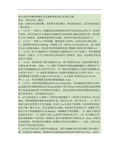
2013-2014年物理奥林匹克竞赛国家集训队热学练习题姓名:所在中学:成绩:注意:必须写出完整步骤,否则得不到步骤分。
答卷请勿涂改,无法看清的地方一律不给分。
1、(12分)一端开口,横截面积处处相等的长管中充有压强p的空气。
先对管子加热,使它形成从开口端温度1000K均匀变为闭端200K的温度分布,然后把管子开口端密封,再使整体温度降为100K,试问管中最后的压强是多大?2、(12分)一容积为1 升的容器,盛有温度为300 K,压强为30⨯10Pa的氩气,氩的摩尔质量为0.040 kg。
若器壁上有一面积为1.0×10㎝的小孔,氩气将通过小孔从容器内逸出,经过多长时间容器里的原子数减少为原有原子数的 1/e?3、(12分)若认为地球的大气是等温的, 则把所有大气分子压缩为一层环绕地球表面的、压强为一个大气压的厚度为H的均匀气体球壳,试证:这层球壳厚度H 就是大气标高。
4、(12分)标准状态下氦气的粘度为η1,氩气的粘度为η2,他们的摩尔质量分别为M1和M2.。
试问:(1)氦原子和氦原子碰撞的碰撞截面σ1和氩原子与氩原子的碰撞截面σ2之比等于多少?(2)氦的导热系数κ1与氩的导热系数κ2之比等于多少?(3)氦的扩散系数D1与氩的扩散系数D2之比等于多少?(4)此时测得氦气的粘度-3 24η1=1.87⨯10-3N⋅s⋅m-2和氩气的粘度η2=2.11⨯10-3N⋅s⋅m-2。
用这些数据近似的估算碰撞截面σ1,σ2。
5、(12分)在热水瓶里灌进质量为m=1.00 kg的水,热水瓶胆的内表面S=700 cm,瓶胆内外容器的间隙d=5.00 mm,间隙内气体压强p=1.00 Pa,假设热水瓶内的热量只是通过间隙内的气体的热传导而散失。
试确定需要多少时间容器内的水温从90℃降为80℃,取环境温度为20℃。
6、 (12分)加热室A(1000C)中蒸发出来的铍原子(相对原子质量为9)经小孔逸出,再经狭缝准直器B而形成原子束,最后进入另一真空室D中,(1)原子束将与真空室背景分子进行碰撞,若进行1m后其原子束强度(单位时间内通过的原子数)减少为1/e。
奥林匹克物理竞赛试题及答案
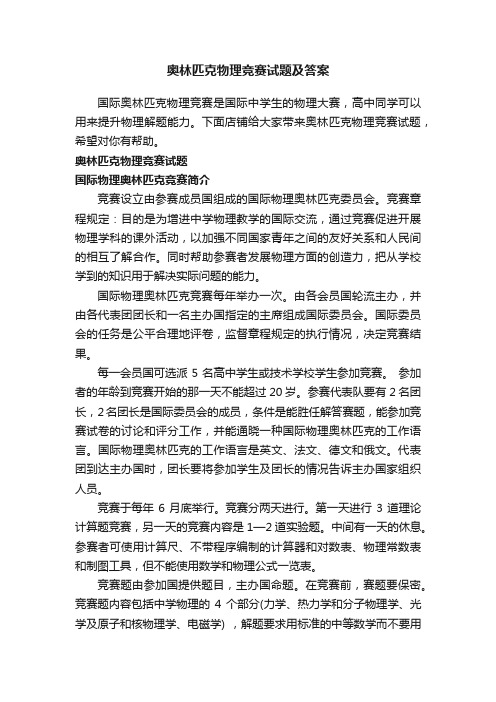
奥林匹克物理竞赛试题及答案国际奥林匹克物理竞赛是国际中学生的物理大赛,高中同学可以用来提升物理解题能力。
下面店铺给大家带来奥林匹克物理竞赛试题,希望对你有帮助。
奥林匹克物理竞赛试题国际物理奥林匹克竞赛简介竞赛设立由参赛成员国组成的国际物理奥林匹克委员会。
竞赛章程规定:目的是为增进中学物理教学的国际交流,通过竞赛促进开展物理学科的课外活动,以加强不同国家青年之间的友好关系和人民间的相互了解合作。
同时帮助参赛者发展物理方面的创造力,把从学校学到的知识用于解决实际问题的能力。
国际物理奥林匹克竞赛每年举办一次。
由各会员国轮流主办,并由各代表团团长和一名主办国指定的主席组成国际委员会。
国际委员会的任务是公平合理地评卷,监督章程规定的执行情况,决定竞赛结果。
每一会员国可选派5名高中学生或技术学校学生参加竞赛。
参加者的年龄到竞赛开始的那一天不能超过20岁。
参赛代表队要有2名团长,2名团长是国际委员会的成员,条件是能胜任解答赛题,能参加竞赛试卷的讨论和评分工作,并能通晓一种国际物理奥林匹克的工作语言。
国际物理奥林匹克的工作语言是英文、法文、德文和俄文。
代表团到达主办国时,团长要将参加学生及团长的情况告诉主办国家组织人员。
竞赛于每年6月底举行。
竞赛分两天进行。
第一天进行3道理论计算题竞赛,另一天的竞赛内容是1—2道实验题。
中间有一天的休息。
参赛者可使用计算尺、不带程序编制的计算器和对数表、物理常数表和制图工具,但不能使用数学和物理公式一览表。
竞赛题由参加国提供题目,主办国命题。
在竞赛前,赛题要保密。
竞赛题内容包括中学物理的4个部分(力学、热力学和分子物理学、光学及原子和核物理学、电磁学) ,解题要求用标准的中等数学而不要用高等数学。
主办国提出评卷标准并指定评卷人。
每题满分为10分。
各代表团团长同时对自己团员竞赛卷的复制品进行评定,最后协商决定成绩。
评奖标准是以参赛者前三名的平均分数计为100%,参赛者达90% 以上者为一等奖,78—90%者为二等奖,65—78%者为三等奖,同时发给证书。
国际物理奥林匹克竞赛试题.doc
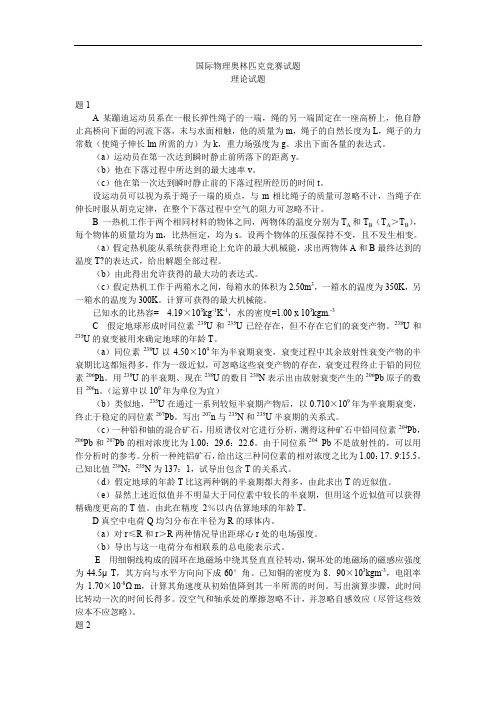
国际物理奥林匹克竞赛试题理论试题题1A 某蹦迪运动员系在一根长弹性绳子的一端,绳的另一端固定在一座高桥上,他自静止高桥向下面的河流下落,末与水面相触,他的质量为m,绳子的自然长度为L,绳子的力常数(使绳子伸长lm所需的力)为k,重力场强度为g。
求出下面各量的表达式。
(a)运动员在第一次达到瞬时静止前所落下的距离y。
(b)他在下落过程中所达到的最大速率v。
(c)他在第一次达到瞬时静止前的下落过程所经历的时间t。
设运动员可以视为系于绳子一端的质点,与m相比绳子的质量可忽略不计,当绳子在伸长时服从胡克定律,在整个下落过程中空气的阻力可忽略不计。
B 一热机工作于两个相同材料的物体之间,两物体的温度分别为T A和T B(T A>T B),每个物体的质量均为m,比热恒定,均为s。
设两个物体的压强保持不变,且不发生相变。
(a)假定热机能从系统获得理论上允许的最大机械能,求出两物体A和B最终达到的温度T?的表达式,给出解题全部过程。
(b)由此得出允许获得的最大功的表达式。
(c)假定热机工作于两箱水之间,每箱水的体积为2.50m3,一箱水的温度为350K,另一箱水的温度为300K。
计算可获得的最大机械能。
已知水的比热容= 4.19×103kg-1K-1,水的密度=1.00 x 103kgm.-3C 假定地球形成时同位素238U和235U已经存在,但不存在它们的衰变产物。
238U和235U的衰变被用来确定地球的年龄T。
(a)同位素238U以4.50×109年为半衰期衰变,衰变过程中其余放射性衰变产物的半衰期比这都短得多,作为一级近似,可忽略这些衰变产物的存在,衰变过程终止于铅的同位素206Ph。
用238U的半衰期、现在238U的数目238N表示出由放射衰变产生的206Pb原子的数目206n。
(运算中以109年为单位为宜)(b)类似地,235U在通过一系列较短半衰期产物后,以0.710×109年为半衰期衰变,终止于稳定的同位素207Pb。
第届国际物理奥林匹克竞赛试题与解答(一)
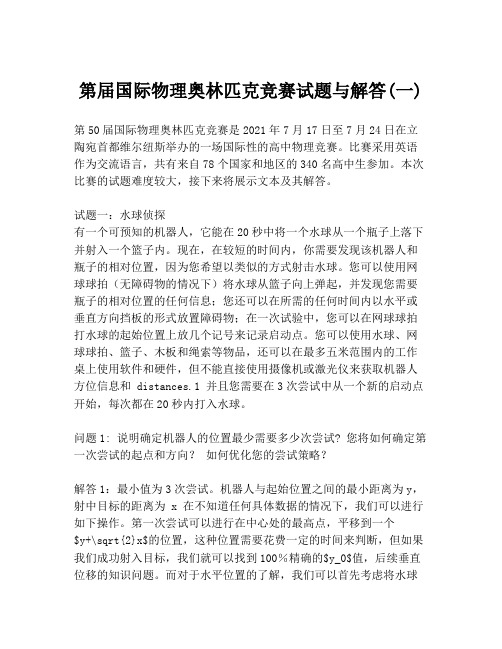
第届国际物理奥林匹克竞赛试题与解答(一)第50届国际物理奥林匹克竞赛是2021年7月17日至7月24日在立陶宛首都维尔纽斯举办的一场国际性的高中物理竞赛。
比赛采用英语作为交流语言,共有来自78个国家和地区的340名高中生参加。
本次比赛的试题难度较大,接下来将展示文本及其解答。
试题一:水球侦探有一个可预知的机器人,它能在20秒中将一个水球从一个瓶子上落下并射入一个篮子内。
现在,在较短的时间内,你需要发现该机器人和瓶子的相对位置,因为您希望以类似的方式射击水球。
您可以使用网球球拍(无障碍物的情况下)将水球从篮子向上弹起,并发现您需要瓶子的相对位置的任何信息;您还可以在所需的任何时间内以水平或垂直方向挡板的形式放置障碍物;在一次试验中,您可以在网球球拍打水球的起始位置上放几个记号来记录启动点。
您可以使用水球、网球球拍、篮子、木板和绳索等物品,还可以在最多五米范围内的工作桌上使用软件和硬件,但不能直接使用摄像机或激光仪来获取机器人方位信息和 distances.1 并且您需要在3次尝试中从一个新的启动点开始,每次都在20秒内打入水球。
问题1: 说明确定机器人的位置最少需要多少次尝试? 您将如何确定第一次尝试的起点和方向?如何优化您的尝试策略?解答1:最小值为3次尝试。
机器人与起始位置之间的最小距离为y,射中目标的距离为 x 在不知道任何具体数据的情况下,我们可以进行如下操作。
第一次尝试可以进行在中心处的最高点,平移到一个$y+\sqrt{2}x$的位置,这种位置需要花费一定的时间来判断,但如果我们成功射入目标,我们就可以找到100%精确的$y_0$值,后续垂直位移的知识问题。
而对于水平位置的了解,我们可以首先考虑将水球从一个中心点射出,使其成为一个匀加速运动,然后用一块水平板从左到右或从右到左预定一个固定距离,进一步将初始位置确定为距板最近的位置,然后调整初始角度。
这个角度可以通过打二角中心的两个球与板的交点来确定。
IPhO2014-第45届国际物理奥林匹克竞赛理论试题与解答
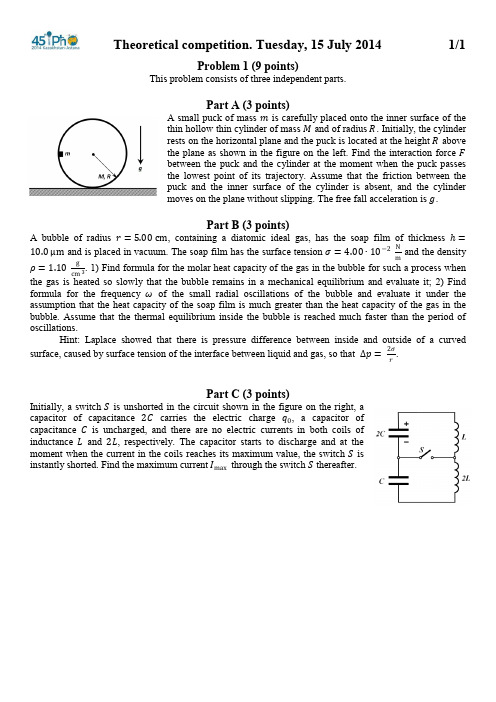
N
10.0 μm and is placed in vacuum. The soap film has the surface tension = 4.00 ∙ 10−2 m and the density
Consider the forces acting on the puck and the cylinder and
depicted in the figure on the right. The puck is subject to the
gravity force and the reaction force from the cylinder . The
instantly shorted. Find the maximum current max through the switch thereafter.
Theoretical competition. Tuesday, 15 July 2014
1/4
Problem 1
Solution
Part A
the plane as shown in the figure on the left. Find the interaction force
between the puck and the cylinder at the moment when the puck passes
the lowest point of its trajectory. Assume that the friction between the
历届IPho试题-历届IPho试题-IPhO-37ThCovermand
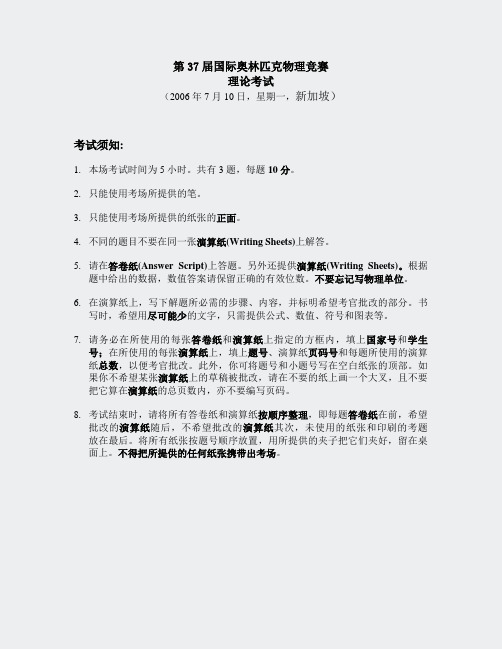
第37届国际奥林匹克物理竞赛
理论考试
(2006年7月10日,星期一,新加坡)
考试须知:
1.本场考试时间为5小时。
共有3题,每题10分。
2.只能使用考场所提供的笔。
3.只能使用考场所提供的纸张的正面。
4.不同的题目不要在同一张演算纸(Writing Sheets)上解答。
5.请在答卷纸(Answer Script)上答题。
另外还提供演算纸(Writing Sheets)。
根据
题中给出的数据,数值答案请保留正确的有效位数。
不要忘记写物理单位。
6.在演算纸上,写下解题所必需的步骤、内容,并标明希望考官批改的部分。
书
写时,希望用尽可能少的文字,只需提供公式、数值、符号和图表等。
7.请务必在所使用的每张答卷纸和演算纸上指定的方框内,填上国家号和学生
号;在所使用的每张演算纸上,填上题号、演算纸页码号和每题所使用的演算纸总数,以便考官批改。
此外,你可将题号和小题号写在空白纸张的顶部。
如果你不希望某张演算纸上的草稿被批改,请在不要的纸上画一个大叉,且不要把它算在演算纸的总页数内,亦不要编写页码。
8.考试结束时,请将所有答卷纸和演算纸按顺序整理,即每题答卷纸在前,希望
批改的演算纸随后,不希望批改的演算纸其次,未使用的纸张和印刷的考题放在最后。
将所有纸张按题号顺序放置,用所提供的夹子把它们夹好,留在桌面上。
不得把所提供的任何纸张携带出考场。
高中物理奥赛综合训练题(参考解答或答案)

高中物理奥赛综合训练题1、长方形风筝如图1所示,其宽度a = 40cm ,长度b = 50cm ,质量M = 200g(其中包括以轻绳吊挂的纸球“尾巴”的质量M′= 20g ,纸球可当作质点)。
AO 、BO 、CO 为三根绑绳,AO=BO,C为底边中点;绑绳及放风筝的牵绳均不可伸缩,质量不计。
放风筝时,设风速为零,牵绳保持水平拉紧状态。
当放风筝者以速度v持牵绳奔跑时,风筝单位面积所受的空气作用力垂直于风筝表面,量值为P = Kvsinα,K = 8N s/m3,α为风筝表面与水平面的夹角。
风筝表面为光滑平面,各处所受空气作用力近似相等,g取10m/s2。
试求:(1)放风筝者至少应以多大速度持牵绳奔跑,风筝才能做水平飞行?(2)这时风筝面与水平面的夹角应为何值?假设通过调整绑绳长度可使风筝面与水平面成任意角度α。
2、如图2是一个直径为D的圆柱体,其侧面刻有螺距为h的螺旋形凹槽,槽内有一小球,为使小球能自由落下,必须要以多大的加速度来拉缠在圆柱体侧面的绳子?3、(前苏联奥林匹克竞赛题)快艇系在湖边,湖岸是直线,系绳突然松脱,风吹着快艇以恒定速度v0 = 2.5km/h沿与湖岸成15°角的方向飘去,一人能在岸上以v1 = 4km/h行走或在水中以v2 = 2km/h游泳。
试问:(1)他能否赶上快艇;(2)当快艇速度多大时,他总可以赶上快艇。
4、(北京市高中物理竞赛题)一辆汽车沿水平公路以速度v无滑动地运动,如果车轮半径为R ,试求车轮抛出的水滴上升的最大高度和抛出点的位置。
5、(全国中学生物理竞赛题)图3中,AOB是一内表面光滑的楔形槽,固定在水平桌面(图中纸面)上,夹角α = 15°,现将一质点在BOA面内从C处以速度v = 3m/s射出,其方向与AO间的夹角为β = 30°,OC= 1m ,设质点与桌面的摩擦可忽略不计,质点与OB 面及OA面的碰撞都是弹性碰撞,且每次碰撞时间极短,可忽略不计。
全国高中物理奥林匹克竞赛试题及答案解析
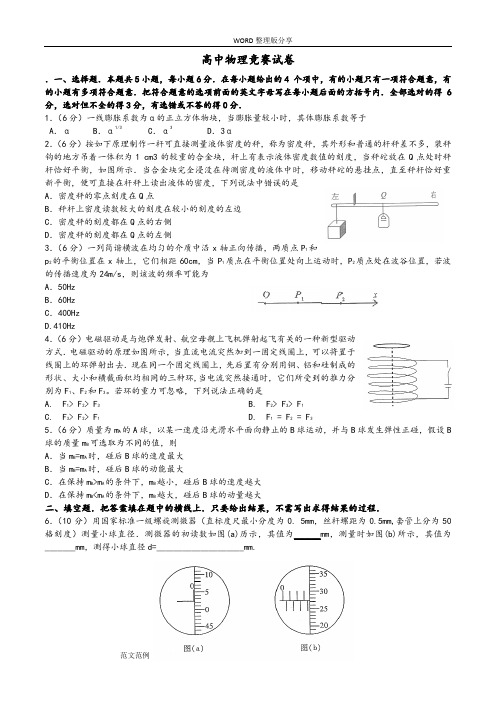
高中物理竞赛试卷.一、选择题.本题共5小题,每小题6分.在每小题给出的4 个项中,有的小题只有一项符合题意,有的小题有多项符合题意.把符合题意的选项前面的英文字母写在每小题后面的方括号内.全部选对的得6分,选对但不全的得3分,有选错或不答的得0分.1.(6分)一线膨胀系数为α的正立方体物块,当膨胀量较小时,其体膨胀系数等于A.α B.α1/3 C.α3 D.3α2.(6分)按如下原理制作一杆可直接测量液体密度的秤,称为密度秤,其外形和普通的杆秤差不多,装秤钩的地方吊着一体积为1 cm3的较重的合金块,杆上有表示液体密度数值的刻度,当秤砣放在Q点处时秤杆恰好平衡,如图所示.当合金块完全浸没在待测密度的液体中时,移动秤砣的悬挂点,直至秤杆恰好重新平衡,便可直接在杆秤上读出液体的密度,下列说法中错误的是A.密度秤的零点刻度在Q点B.秤杆上密度读数较大的刻度在较小的刻度的左边C.密度秤的刻度都在Q点的右侧D.密度秤的刻度都在Q点的左侧3.(6分)一列简谐横波在均匀的介质中沿x轴正向传播,两质点P1和p2的平衡位置在x轴上,它们相距60cm,当P1质点在平衡位置处向上运动时,P2质点处在波谷位置,若波的传播速度为24m/s,则该波的频率可能为A.50HzB.60HzC.400HzD.410Hz4.(6分)电磁驱动是与炮弹发射、航空母舰上飞机弹射起飞有关的一种新型驱动方式.电磁驱动的原理如图所示,当直流电流突然加到一固定线圈上,可以将置于线圈上的环弹射出去.现在同一个固定线圈上,先后置有分别用铜、铝和硅制成的形状、大小和横截面积均相同的三种环,当电流突然接通时,它们所受到的推力分别为F1、F2和F3。
若环的重力可忽略,下列说法正确的是A. F1> F2> F3B. F2> F3> F1C. F3> F2> F1D. F1 = F2 = F35.(6分)质量为m A的A球,以某一速度沿光滑水平面向静止的B球运动,并与B球发生弹性正碰,假设B 球的质量m B可选取为不同的值,则A.当m B=m A时,碰后B球的速度最大B.当m B=m A时,碰后B球的动能最大C.在保持m B>m A的条件下,m B越小,碰后B球的速度越大D.在保持m B<m A的条件下,m B越大,碰后B球的动量越大二、填空题.把答案填在题中的横线上.只要给出结果,不需写出求得结果的过程.6.(10分)用国家标准一级螺旋测微器(直标度尺最小分度为0. 5mm,丝杆螺距为0.5mm,套管上分为50格刻度)测量小球直径.测微器的初读数如图(a)历示,其值为______mm,测量时如图(b)所示,其值为_______mm,测得小球直径d=____________________mm.7.(10分)为了缓解城市交通拥堵问题,杭州交通部门在禁止行人步行的十字路口增设“直行待行区”(行人可从天桥或地下过道过马路),如图所示,当其他车道的车辆右拐时,直行道上的车辆可以提前进入“直行待行区”;当直行绿灯亮起时,可从“直行待行区”直行通过十字路口.假设某十字路口限速50km/h,“直行待行区”的长度为12m,从提示进入“直行待行区”到直行绿灯亮起的时间为4s.如果某汽车司机看到上述提示时立即从停车线由静止开始匀加速直线运动,运动到“直行待行区”的前端虚线处正好直行绿灯亮起,汽车总质量为1. 5t,汽车运动中受到的阻力恒为车重的0.1倍,则该汽车的行驶加速度为________;在这4s内汽车发动机所做的功为___________。
历届国际物理奥林匹克竞赛试题及解答

历届国际物理奥林匹克竞赛试题与解答第1届(1967年于波兰的华沙)【题1】质量M=0.2kg 的小球静置于垂直柱上,柱高h=5m 。
一粒质量m=0.01kg 、以速度=500m/s 飞行的子弹水平地穿过球心。
球落在距离柱s =20m 的地面上。
问子弹落在地面何处?子弹动能中有多少转换为热能?解:在所有碰撞情况下,系统的总动量均保持不变: 其中v 和V 分别是碰撞后子弹的速度和小球的速度. 两者的飞行时间都是01.12==ght s 球在这段时间沿水平方向走过20m 的距离,故它在水平方向的速度为:8.1901.120==V (m/s ) 由方程0.01×500=0.01v +0.2×19.8 可求出子弹在碰撞后的速度为:v =104m/s子弹也在1.01s 后落地,故它落在与柱的水平距离为S =vt =104×1.01=105m 的地面上。
碰撞前子弹的初始动能为=2021mv 1250 J 球在刚碰撞后的动能为=221MV 39.2 J 子弹在刚碰撞后的动能为=221mv 54 J与初始动能相比,两者之差为1250 J -93.2 J =1156.8 J这表明原来动能的92.5%被系统吸收而变为热能。
这种碰撞不是完全非弹性碰撞。
在完全弹性碰撞的情形下,动能是守恒的。
而如果是完全非弹性碰撞,子弹将留在球内。
【题2】右图(甲)为无限的电阻网络,其中每个电阻均为r ,求A、B两点间的总电阻。
解:如图(乙)所示A、B两点间的总电阻应等于C、D两点间的总电阻与电阻r的并联,再与r串联 图(甲) 后的等效电阻。
如果网络是无限的,则A、B两点间的总电阻应等于C、D 两点间的总电阻,设为R*。
根据它们的串并联关系有:m MhSsυABr r r r r r r rA B r r r r r r r r CDrR rR r R x xx ++= 图(乙) 解上式可得:r R x 251+=【题3】给定两个同样的球,其一放在水平面上,另一个以细线悬挂。
物理奥林匹克竞赛试题

物理奥林匹克竞赛试题一、选择题(每题3分,共15分)1. 一个物体在水平面上以恒定加速度运动,已知其初速度为v0,经过时间t后,速度变为v。
假设加速度为a,以下哪个公式是正确的?- A) v = v0 + at- B) v = v0 - at- C) v = v0 * at- D) v = (v0 + at) / 22. 一个质量为m的物体从静止开始自由下落,忽略空气阻力,经过时间t后,其速度v和下落距离h与以下哪个公式相符?- A) v = gt; h = 1/2gt^2- B) v = 1/2gt; h = gt^2- C) v = gt^2; h = 1/2gt- D) v = gt; h = gt3. 两个点电荷q1和q2,分别位于x轴上的点A和B,点A的坐标为(-a, 0),点B的坐标为(a, 0)。
如果q1 = +Q,q2 = -Q,那么在x轴上距离A点距离为r的点C的电场强度大小为:- A) E = kQ/(a^2 + r^2)- B) E = kQ/(a^2 - r^2)- C) E = kQr/(a^2 + r^2)^(3/2)- D) E = kQr/(a^2 - r^2)^(3/2)4. 一个质量为m的物体在摩擦系数为μ的水平面上以初速度v0滑行,最终停止。
假设物体在滑行过程中没有其他外力作用,那么物体滑行的距离s与以下哪个公式相符?- A) s = v0^2 / (2μg)- B) s = v0^2 / (2μg + 1)- C) s = v0^2 / (2g - μ)- D) s = v0^2 / (2g + μ)5. 一个理想变压器的原线圈和副线圈的匝数比为N1:N2,当原线圈中的电流I1变化时,副线圈中的电流I2将如何变化?- A) I2 = N2/N1 * I1- B) I2 = N1/N2 * I1- C) I2 = (N2^2/N1^2) * I1- D) I2 = (N1^2/N2^2) * I1二、简答题(每题5分,共10分)1. 请解释什么是相对论性质量,并给出一个日常生活中的例子来说明它。
高中物理奥林匹克竞赛专题---相对论习题及答案

第十六章相对论题16.1:设'S 系以速率v = 0.60c 相对于S 系沿'xx 轴运动,且在t ='t = 0时,0'==x x 。
(1)若有一事件,在 S 系中发生于t = 2.0×10-7 s ,x = 50 m 处,该事件在 'S 系中发生于何时刻?(2)如有另一事件发生于 S 系中 t = 3.0×10-7 s ,x = 10 m 处,在 S ′系中测得这两个事件的时间间隔为多少?题16.1解:(1)由洛伦兹变换可得S ′系的观察者测得第一事件发生的时刻为(2)同理,第二个事件发生的时刻为所以,在S ′系中两事件的时间间隔为题16.2:设有两个参考系S 和S ′,它们的原点在t = 0和t ′ = 0时重合在一起。
有一事件,在 S ′系中发生在 t ′ = 8.0×10-8 s ,x ′ = 60 m ,y ′ = 0,z ′ = 0处,若S ′系相对于S 系以速率v = 0.6c 沿xx ′轴运动,问该事件在S 系中的时空坐标各为多少?题16.2解:由洛伦兹逆变换得该事件在S 系的时空坐标分别为题16.3:一列火车长 0.30 km (火车上观察者测得),以 100 km/h 的速度行驶,地面上观察者发现有两个闪电同时击中火车的前后两端。
问火车上的观察者测得两闪电击中火车前后两端的时间间隔为多少?题16.3解:设地面为S 系,火车为S ′系,把闪电击中火车前后端视为两个事件(即两组不同的时空坐标)。
由洛伦兹变换可得两事件时间间隔为221221212/1)''()''(cv x x c v t t t t --+-=-(1) 221221212/1)()(''cv x x c v t t t t ----=-(2) 利用这两式都可以得到结果。
解法1:由题意闪电在S 系中的时间间隔∆t = t 2 - t 1 = 0。
第14届国际物理奥林匹克竞赛试题及解答(英文)

A friction force, with aere on the particle.
The particle starts from the point x?x0?1,00m having the kinetic energyEc?10,0J.
The potential energy of the particle can be represented in analogy to the gravitational potential energy of the ball,m?g?h, considering m?g?Fx;h?x. As is very well known, in the field of a conservative force, the variation of the potential energy depends only on the initial and final positions of the particle, being independent of the path between those positions.
particle as the vertical motion of a small elastic ball elastically colliding with the ground and moving with constant friction through the medium. The friction force is smaller than the weight.
For the situation in the problem, when the particle moves towards the wall, the force acting on it is directed t
04历届国际物理奥林匹克竞赛试题与解答

历届国际物理奥林匹克竞赛试题与解答第4届(1970年于苏联的莫斯科)【题1】如图4.1(a )、(b ),在质量M =1kg 的木板上有质量m =0.1kg 的小雪橇。
雪橇上的马达牵引着一根绳子,使雪橇以速度v 0=0.1m/s 运动。
忽略桌面与木板之间的摩擦。
木板与雪橇之间的摩擦系数μ=0.02。
把住木板,起动马达。
当雪橇达到速度v 0时,放开木板。
在此瞬间,雪橇与木板端面的距离L =0.5m 。
绳子拴在(a )远处的桩子,(b )木板的端面上。
试描述两种情形下木板与雪橇的运动。
雪橇何时到达木板端面?图4.1(a ) 图4.1(b )解:(a )在第一种情形中(如图4.1(a )),雪橇处于匀速运动状态。
雪橇与木板以不同的速度运动。
这样引起的最大摩擦力为 m g ,它作用在木板上,产生的加速度M mga μ=,直至木板达到雪橇的速度v 0为止。
加速时间为mgM v a v t μ000===5.1s 在这段时间内,雪橇的位移为mgM v a v S μ2220200===0.255m 因此,雪橇离木板右端点的距离为0.5m -0.255m =0.245m雪橇不能达到木板的一端,因为这段时间以后,木板与雪橇以相同的速度v 0一起运动。
在木板加速期间,马达必须用力 m g 牵引绳子,但以后马达不能施加力的作用,它只是卷绳子。
(b )在第二种情形中(如图 4.1(b )),木板与桌面之间无摩擦。
木板与雪橇形成一个孤立系统,可以用动量守恒定律。
当我们放开木板时,雪橇的动量为mv 0,释放后的木板具有速度v 2,它由下式决定:mv 0=M v 2+m (v 0+v 2)此式表明v 2=0,所以木板保持不动,雪橇以同一速度继续前进。
雪橇达到木板右端的时间为1.05.00==v L t =5 s【题2】NaCl 的晶体点阵由边长为5.6×10-8cm 的立方晶胞组成,它是面心立方点阵。
钠原子量约为23,氯原子量为35.5,NaCl密度为2.22g/cm 3。
2014年全俄物理奥林匹克理论部分(附答案)

2014年全俄物理奥林匹克(理论部分)九年级问题9-1极速赛车赛车在赛道的直路段上沿同一方向匀加速行驶,平均速度为v 。
求赛车在路段中点处的速度的最大值max v 与最小值min v 。
问题9-2在阳台上实验员格鲁克从17楼的阳台上将质量为m 的乒乓球以速度0v 竖直向上抛出。
小球在飞行的过程中所受到的阻力与速度成正比。
在落到地面之前,小球以速度2v 匀速下落。
求小球的运动过程中动能变化最快的时刻的速度max v 。
问题9-3水下工作潜水罩形如无底圆柱,放在水下,里面有一部分空气。
为了使得罩不会浮起来,用缆绳绑在水底。
用一根细绳将重物系在罩上,如图1所示。
罩的横截面积S =4m 2,里面空气的体积V =8m 3,压强p =1.5×105Pa 。
将罩里的重物拉出水面后①,空气压强增加了Δp =250Pa ,缆绳仍然处于拉伸状态。
求细绳和缆绳中张力的变化量。
水的密度ρ=103kg/m 3,重力加速度g =10m/s 2,罩里的空气符合波义耳定律pV =常数,其中p 为压强,V 为罩里空气的体积。
图1图2① 译者注:指的是用细绳往上拉重物,“细绳中张力的变化量”指的是下面绷紧的那段。
问题9-4 细绳上的冰柱圆柱形冰柱的竖直轴的位置有细孔,从里面穿过细绳,另一头系有热传导率非常高的小球。
实验的一开始,将小球加热到温度T1,冰柱的温度等于室温T0=0℃。
随着冰的融化,冰柱下落,如图2所示,以温度为T0的水滴的形式滴下。
球的后面留下圆柱形的通道,横截面积S=2cm2。
⑴如果冰柱停止下落时,被小球融化的通道长度H=10cm,求小球一开始的温度T1;⑵如果冰柱下落23H时的速度20.1v mm/s,求一开始下落的速度v0。
设热传导的功率与小球和冰之间的温度差成正比,热量全部用来使冰融化。
小球的热容量C=59.4J/℃,冰的熔解热λ=330kJ/(kg·℃),冰的密度ρ=900kg/m3。
问题9-5 电路中的计算机实验员格鲁克用电流源组建了电路,可以输出可变的电压。
2014年泛珠三角及中华名校物理奥林匹克邀请赛试题及答案
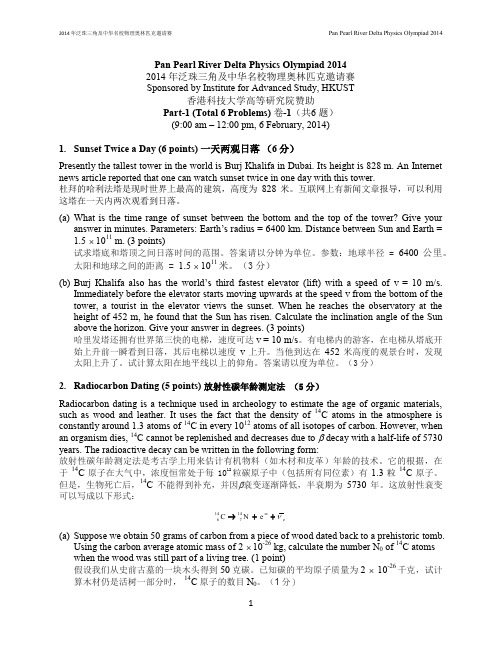
(c) An archaeologist claims that he/she discovered a fossil plant with an age of 2 108 years using the method of radiocarbon dating. A scientist says that this result is nonsense. Which side will you stand on? Please explain your reasons. (1 point) 8 某考古学家声称,他/她利用放射性碳年龄测定法,发现年代为 2 10 年的化石植物。某科
1
2014 年泛珠三角及中华名校物理奥林匹克邀请赛
Pan Pearl River Delta Physics Olympiad 2014
(b) We can determine the age of the tomb if we know the number N of 14C atoms from the 50 grams of carbon. There is no way to directly count the number of 14C atoms, but we detect a total of 935 electrons emitted from the 50 grams of carbon in 10 minutes. How old is the tomb? (3 points) 要估算古墓的年代,我们需要知道该 50 克碳中 14C 原子的数目 N。我们无法直接数算 14C 原 子的数目,但我们发现 50 克碳在 10 分钟内放射了共 935 粒电子。古墓的年龄是多少?(3
题中,我们将以气体运动理论分析流体的粘度。
第45届国际物理奥林匹克竞赛实验试题简介

第45届国际物理奥林匹克竞赛实验试题简介张春玲;刘丽飒;宋峰;刘玉斌【摘要】T his paper introduced the 45th International Physics Olympiad experiment test ,w hich consisted of one task :To see invisible!The problems were introduced in detail with brief comments .%第45届国际物理奥林匹克竞赛的实验试题为“看见隐藏的现象!”。
本文介绍了试题内容及解答思路,并对中国队学生部分题目的答题情况作了简短评论。
【期刊名称】《物理实验》【年(卷),期】2014(000)012【总页数】9页(P10-18)【关键词】国际物理奥林匹克竞赛;偏振;激光【作者】张春玲;刘丽飒;宋峰;刘玉斌【作者单位】南开大学物理科学学院,天津300071;南开大学物理科学学院,天津300071;南开大学物理科学学院,天津300071;南开大学物理科学学院,天津300071【正文语种】中文【中图分类】G633.71 引言第45届国际物理奥林匹克竞赛于2014年7月11日至7月19日在哈萨克斯坦的阿斯塔纳举行,代表中国参赛的5名中学生全部获得了金牌.本届竞赛的实验题是一道大的光学题目,题名为“看见隐藏的现象!”,主要考查与光的偏振相关的知识.因篇幅有限,我们对原题作缩略,提炼出主要问题,给出简要的试题解答,并对中国队选手的答题情况给出简短评论.2 试题介绍实验中用到的器件及其实物图如表1所示.表1 实验中用到的器件及其实物图器件实物图1.光学座及夹具: 1a,1b.固定光源和光电探测器的带有螺丝的夹具;1c,1d.固定偏振片的卡槽;1е.固定屏幕及液晶盒的卡槽. 2a,2b.固定在支架上的偏振片(在偏振片正面贴有数字1及2. 安装偏振片时,应该正面对着光源!偏振片的偏振方向与水平方向夹角为45°).3.有缝(3a)及尺(3b)的屏幕.4.光电二极管:4a.电源连接接头; 4b.固定螺钮.5.激光器:5a.转动激光器的带有刻度的盘; 5b.电源连接接头; 5c.光源前用来调整光束宽度的螺钮;5d.固定螺母.6.光源的电源:6a.开关;6b.电源接头.续表器件实物图7.可调电阻器:7a,7b,7c.连接电路的接线柱;7d.调整电阻值的旋钮k.8.开关:8a, 8b.连接电路的接线柱.9.液晶盒: 9a.液晶;9b.支架;9c.电源连接头.10.液晶盒的电源:10a.连接液晶盒的接头;10b.测量输出电压的接头;10c.调节输出电压的旋钮;10d.电源开关.11.万用电表:11a.测量电阻的挡位(200 kΩ); 11b.测量直流电压的挡位(2 V);11c.测量交流电压的挡位(20 V);11d,11e.测量连接头;11f.电源开关.12.塑料尺: 12a.1号塑料尺(刻度范围0~14 cm);12b.2号塑料尺(刻度范围20~34 cm).13.可弯曲透明塑料薄带.14.滤光片.塑料尺及薄带有双折射现象,它们的光轴在各自平面内.15.光电探测器 (光电二极管):15a.入射窗口; 15b.用来测量输出电压的接头; 15c.固定用螺母.连接线, 夹子, 纸巾, 1张纸很多物质具有光学各向异性,光的折射率依赖于光的传播方向和偏振方向. 偏振片1的透振平面与偏振片表面的交线为O1O1′(如图1),光线入射到偏振片1上,通过偏振片后成为线偏振光,其电场矢量Eins的振动方向在偏振片1的透振平面内. 接着光线照射到各向异性光学薄片P上,P的光轴方向PP′在晶体平面内且与偏振片1的透振平面成45°. 在P内光可被分成2种:振动方向垂直于光轴的寻常光Eo和振动方向平行于光轴的非寻常光Ee. 这2种光波的折射率不同,其折射率差为Δn=no-ne,从光学薄片出射时两光波的相位差为Δφ=2πhΔn/λ(h为薄片厚度,λ为入射光在真空中的波长). 因此,出射光的偏振态发生改变,2种光合成为椭圆偏振光. 接着,光束照射到偏振片2上,偏振片2的透振平面与偏振片1的透振平面垂直. 图1 研究光学各向异性的实验装置经过简单推导可得光束经过光学薄片P和偏振片2后的光强为其中,I0为照射到光学薄片上的光强,k为光通过光学薄片P和偏振片2的透过率系数,Δφ为经过光学薄片P后寻常光与非寻常光的相位差.2.1 定性现象观察(3.5分)2.1.1 偏振片(0.8分)找出偏振片1和偏振片2的透振平面.2.1.2 尺子(1.0分)将LED固定在支架上,并连接好电源. 安装2个偏振片,有标号的一面(正面)朝向光源,确保2个偏振片的透振平面正交,即第二个偏振片后没有光线透出. 如图2~3,用1张白纸挡在第一个偏振片的正面,在2个偏振片中间放塑料尺子. 要求:找出塑料尺所有可能的光轴方向;分别估算在1号尺子上和2把尺子重叠这2种情况时, 大概在什么距离蓝光的相位差改变2π.图2 把塑料尺固定在屏幕上图3 观察塑料尺双折射现象的装置2.1.3 塑料薄带(0.8分)要求:找出薄带所有可能的光轴方向;将薄带用夹子固定在屏上,薄带的边缘与屏的边缘对齐,如图4,将屏放在2个偏振片中间,移动屏观察薄带上的色彩变化,以屏的左边缘作为x轴的零点,测量2个暗带的中间点的坐标(左边的坐标为xL,右边的坐标为xR).图4 将可弯曲的塑料胶带固定在屏幕上2.1.4 液晶盒(0.9分)液晶是介于固态晶体和无定型液体之间的一种物质, 可以通过外加电场调整和控制其分子取向. 液晶具有各向异性,有2个折射率. 各向异性现象的效果依赖于外加的交流(AC)电压. 液晶盒由2个玻璃片组成,玻璃片的内表面镀有透明的导体层,2个玻璃片之间是薄薄的液晶层,玻璃片上焊有导线以连接AC电源. 不加电压时,液晶的长分子的方向平行于玻璃片,分子的方向与晶体的光轴一致. 将液晶盒放置在2个偏振片中间,并连上电源. 改变加在液晶盒上的电压,观察透过液晶盒的光的色彩变化. 要求:加在液晶盒上的电压为零和最大电压情况下,观察并确定所有可能的光轴方向,并在答题卡上标出来,设z轴为竖直方向;测量当液晶分子轴向发生90°突变时,加在液晶盒上的电压Ucr.2.2 测量(16.5分)将激光、偏振片1、有开口的屏幕以及光电探测器(1个光电二极管)固定在底座上. 调整实验装置,使激光束通过起偏器和屏幕的开口后正好照在光电二极管上. 利用旋钮5c使光电二极管上的光斑尺寸为5~6 mm.激光器出射的是线偏振光. 用旋转圆盘5a来调整激光的偏振方向,使激光束基本上全部通过第一个偏振片,并且椭圆形光斑的长轴在竖直方向. 安装偏振片2,确保2个偏振片是正交的. 图5为安装屏幕之后的整套实验装置.图5 测量塑料尺透射光的装置2.2.1 研究光电二极管 (3.2 分)采用光电二极管测量光强,其电动势是照射光强度的复杂函数,电路如图6所示. 万用表测直流(DC)电压依赖于照射光强度和可变电阻器的阻值. 下面实验的主要目标是选择电阻的最佳值,使电阻上的电压值与照射在光电二极管上的光强成正比.图6 测量光电二极管电动势的电路从光学座上取下第二个偏振片和屏,用夹子将减弱光强的衰减片固定在偏振片的后面,如图7所示. 被测电压的最大值必须超过300 mV. 利用万用表测量电阻器的电阻值和电阻器上的电压,将开关放在恰当的位置,从而能够采用1个万用表既能测量电阻也能测量电压,也就是只通过打开和合上开关以及调节万用表挡位就能够测量,而不用断开电路.图7 将滤光片固定于偏振片上要求:画出电路图,确保开关的位置能够方便测量电阻器上的电压和电阻;在照射光强度为最大值(滤光片的数量n=0)和最小值(滤光片的数量n=5)时,测定电阻器上的电压与电阻的函数关系,在同一张图上画出相应的2条关系曲线,标出2条曲线的电压差值最大的电阻范围;测量电阻器上的电压U与滤光片数量n=0,1,2,3,4,5的关系(必须采用3个不同的电阻值,大约是30 kΩ, 20 kΩ和10 kΩ),将相应函数关系线画在同一张图上,注意选取合适的坐标以能够说明电阻器上的电阻是否与照射在光电二极管上的光强成线性关系,并根据上面提到的3个电阻值,选择最佳电阻值Ropt,再使用此电阻测量不同光强下的电压并作图. 利用获得的数据,计算滤光片的透过率γ=Itr/Iinc,估计误差,这里Itr为透射光强,Iinc为入射光强.2.2.2 透过塑料尺的光(5.4 分)在后续实验中必须使用上面选定的最佳电阻值,光强采用相对单位mV,数值上等于电阻器上的电压值. 在本部分中使用图5中的光路图,将塑料尺放在2个偏振片之间 ,如图2用夹子把尺子夹在带有开口的屏上,必须和屏上所画的直线重合,确保提供的2把尺子显示双折射现象. 把一把尺子叠放在另外一把尺子上, 当光通过时,观察图样.要求:测量透射光强与光入射到尺子的位置坐标x(0~10 cm)的关系. 要分别测量所提供的每把尺子以及2把尺子叠在一起的情况. 在每种情况下,要测出电压的最大值. 在同一张图中画出每种情况对应的关系曲线.对每把尺子,计算x从0到7 cm所对应的寻常光和非常光之间的相位差Δφ,在图中作出对应的关系线. 写出计算时使用的所有公式. [注意无法通过式(1)直接推出相位差,要正确地计算相位差,还需要一些其他物理条件.]假定2把尺子各自满足线性关系:Δφ1=a1x+b1,Δφ2=a2x+b2,分别确定尺子1和2各系数的数值.利用前面所得到数据,计算2把尺子叠在一起时透射光强的理论值. 写下计算时使用的所有公式. 在此小题前面部分的实验图中加上计算得到的理论曲线.2.2.3 液晶盒 (4.5 分)将液晶盒如图8放在2个偏振片间. 要求:测量透射光的强度与液晶盒所加电压的关系,作图画出相应的关系线. 计算当电源与液晶盒未连接时,寻常光和非常光的相位差Δφ. 液晶盒上所加电压在很宽的范围内,寻常光和非常光的相位差与所加电压之间的关系为Δφ=CUβ,利用所得数据画图,确定上式适用的区间,计算指数β的数值.图8 测量液晶盒特性的装置2.2.4 光透过弯曲塑料薄带(3.4分)按照2.1.3部分的描述把薄带安在屏上. 要求:测量透过光学系统后的光强与光入射到薄带时的光点坐标x的函数关系,x的测量范围为薄带中心的±20 mm,作图画出相应的关系曲线. 计算薄带不弯曲时寻常光和非寻常光的相位差Δφ,已知Δφ处于10π到12π间.薄带靠近中心部分近似是半径为R的圆弧. 理论上相位差Δφ与距薄带中心的距离z(z≪R)满足如下关系式中n=1.4是塑料薄带的折射率. 用前面几部分得到的数据,计算靠近薄带中心部分圆弧的曲率半径R.3 简要解答和中国队学生答题情况分析3.1 定性观察部分偏振片1和偏振片2的透振平面如图9(a)所示. 经过国内培训,学生都知道通过旋转偏振片,透射光强最小时第二个偏振片的透振平面与第一个偏振片的透振平面垂直. 但是一些学生在做此题时感到困惑,因为此题的难度在于判断第一个偏振片的透振平面. 如果在答题时没有思路,但是能够仔细读题,就会在仪器介绍部分和2.2部分找到线索. 首先仪器介绍部分明确写出“偏振片的偏振方向与水平方向夹角为45°”,可以帮助学生初步判断透振平面的方向. 其次2.2部分提到“激光器出射的是线偏振光” ,如果学生据此能够知道激光光斑的方向就是其振动方向,就可以通过旋转第一个偏振片,判断出光强最小时偏振片的透振平面与激光光斑的方向垂直. 如果在读题时没有注意到提示线索,还可以利用布儒斯特角. 自然光在电介质界面上反射时,一般情况下反射光是部分偏振光,但是当入射角为布儒斯特角时反射光是线偏振光,其振动方向与入射面垂直. 通过将LED以布儒斯特角照射在白屏上,让反射光入射偏振片,然后转动偏振片,找到消光的位置,这时偏振片的透光平面刚好和反射线偏振光的偏振方向垂直.塑料尺所有可能的光轴方向如图9(b)所示,为平行和垂直尺子的长边方向. 单独1号尺子和2把尺子叠放时,大概相距12 cm和8 cm时蓝光的相位差改变2π. 塑料薄带的光轴方向如图9(c)所示,与尺子成10°,左边暗带中间点的坐标xL=3.5 cm,右边暗带中间点的坐标xR=7.5 cm. 加在液晶盒上的电压为零和最大电压情况下的光轴方向如图9(d)所示,当液晶分子轴向发生90°突变时,加在液晶盒上的电压Ucr=2 V.(a)(b)(c)(d)图9 定性实验观察部分不同部件的透振平面和光轴方向3.2 测量部分3.2.1 研究光电二极管电路图如图6所示,需要在图6的电阻和光电二极管之间加开关. 在照射光强度为最大值和最小值时,电阻器上的电压与电阻的关系如图10(a),图中阴影部分2条曲线的电压差值最大. 电阻器上的电压U与滤光片数量的关系如表2所示,透过滤光片之后的光强与滤光片的数量之间的关系为In=I0γn,如果测得的电压与光强成比例,则有Un=U0γn,为了验证此关系,只需画出ln U与n的关系ln Un=ln U0+nln γ,如图10(b),根据3条曲线特点,选择最佳电阻值Ropt=5 kΩ,在使用此电阻时测得的不同光强下的电压画在图10(b)中,根据最小二乘法计算出滤光片的透过率γ=0.59±0.02.(a)(b)图10 确定最佳电阻时的实验曲线表2 电阻器上的电压U与滤光片数量的关系nU1/mVln U1U2/mVlnU2U3/mVln U3U4/mVln U403515 8613915 9693885 9613775 93212905 6703705 9143645 8973415 83221685 1243465 8463365 8172945 68439245223175 7593095 7331795 1874564 0252885 6632345 4551054 6545353 5552125 3571484 997664 190注:R1=5.1 kΩ,R2=29.9 kΩ,R3=20.4 kΩ,R4=10.1 kΩ,U1,U2,U3,U4对应R1,R2,R3,R4两端的电压.当2个实验参量之间是简单的线性关系时,中国队的学生能够轻易地画出参量之间的关系曲线,但是当2个参量之间不是明显的线性关系时,个别学生还是依据惯性思维把它们往线性关系上硬套,而不是去看看他们是不是更符合幂函数或者指数函数的关系. 虽然考试时时间有限是理由,但是在这样的大型比赛中因为这方面能力的欠缺而丢失本题的分数,进而对后面的分数产生影响确实是非常可惜.3.2.2 透过塑料尺的光每把尺子和2把尺子叠放,尺子坐标x与透射光强数据见表3,关系曲线见图11(a). 表3 尺子坐标x与透射光强、寻常光和非常光的相位差x/mmU1/mVΔφ1U2/mVΔφ2U1,2/mVUcalc5230,778140,60110,01060,3902 20,76022,11500,000300,89687,72030,275431,0901815,725120,555551,2533 124,730300,896671,4083933,035501,186781,5464139,240711,458901,6964 241,945931,734991,8114140,8501131,9961071,9153636,0551282,2141162, 0382728,5601502,6361232,1382119,6651562,8241292,2301210,9701532,72 01332,29574,1751603,1421302,24620,4801462,5411342,31210,5851462,54 11432,47814,4901402,4191442,498311,4951312,2621462,541620,11001131 ,9961452,5191129,0(a)(b)图11 尺子坐标与透射光强度、相位差的关系利用题目中的式(1)计算相移,可以表示为这里Umax是电压最大值. 通过数据记录和图线,可知Umax=160 mV. 考虑到寻常光和非常光之间的相位差Δφ可能有不同的解,例如:需要根据实验结果选择正确的根. 计算得到的相移的值如表2. 因为Δφ(x)必须是单调的,所以前两个点的符号要改变,画出的每把尺子x从0到7 cm相位差Δφ如图11(b).最小二乘法得到的结果为Δφ1=0.059x-0.94,Δφ2=0.028x+0.52.2把尺子叠在一起时,理论上来说相移就是简单的相加:此处Umax是从实验结果得到的2把尺子叠在一起时测得的最大电压. 将计算得到的理论值列在表3中,并加画在图11(a)上(此处没有给出).3.3 液晶盒液晶盒上所加电压与和光电探测器上的电压关系如图12(a). 为了后面计算相位差,必须为(2)式选择正确的根. 因为液晶盒上所加电压ULC的值比较大时,光电探测器上的电压趋于0,Δφ→0,所以计算得到的相位差如图12(b),电压为0时的相位差Δφ0=10.6.为了验证幂函数Δφ=CUβ的适用性,画幂函数图如图12(c). 由图可知在1~5 V范围内,函数基本是线性的. 函数的幂指数等于直线的斜率,数值为β≈1.75.(a)(b)(c)图12 液晶盒上所加电压与光电探测器上的电压、相位差的关系3.4 光通过塑料薄带光强与光点照到薄带位置坐标x的关系如图13(a). 曲线形状显示Δφ0依赖于光强和相位差之间关系的上升部分,可以计算出因为薄带是弯曲的,光程依赖于光点落到的位置. 靠近薄带的中间部位,其形状类似于圆弧,如图13(b). 令薄带距离其中间z处以角度α朝屏弯曲,薄带的曲率半径则为考虑到光以角度α照射并通过薄带,以及折射定律光程实际为这里h为薄带厚度. 因此,透射之后寻常光与非寻常光相位差这里代表没有弯曲的薄带的相位差或者中心部位的相位差. 在角度α比较小时,上式可近似为(a)(b)图13 薄带相对中心的光强和薄带圆弧区光路示意图这样,要确定曲率半径,需要分析相位差与薄带中心距离平方的函数关系,画出对应关系图后可以发现其中间部分近似为z的抛物线函数Δφ=az2+b. 为了确定函数的系数,画出Δφ与z2的关系图,用最小二乘法得a=0.010 4 mm-1,b=2.45,但是需要加上2π得到b的数值.4 结束语近2年亚洲物理奥赛和国际物理奥赛的实验部分都有一个共同的特点,就是每次实验考试都是1道大的综合题目. 但是虽然是1道题目,却是力电结合、力光结合或者光电结合. 这样做的好处是每道题都是由浅入深,能够比较系统地考察学生的实验水平. 即使实验水平不高的学生也会有入手点,能够拿到一定的基础分,而实验水平高的同学,能够有更多的时间去完成更多的实验内容,取得更高的分数.【相关文献】[1] 吕斯骅,段家忯. 新编基础物理实验[M]. 北京:高等教育出版社,2006.[2] 张春玲,宋峰,刘玉斌,等. 第44届国际物理奥林匹克竞赛实验试题简介[J]. 物理实验,2013,33(12):13-17,20.[3] 张春玲,刘丽飒,宋峰,等. 第15届亚洲物理奥林匹克竞赛实验试题简介[J]. 物理实验,2014,34(8):14-19,24.[4] 张春玲,宋峰,张天浩,等. 第14届亚洲物理奥林匹克竞赛实验试题与中国队学生实验能力分析[J]. 物理实验,2013,33(10):18-26.。
第45届国际物理奥林匹克竞赛——理论考试注意事项

第45届国际物理奥林匹克竞赛
阿斯塔纳,哈萨克斯坦
理论试题
周二, 2014年7月15日
首先阅读下面内容
考试时间为5个小时,共3道试题,总分30分,各题分值不完全相同。
只能使用提供的笔。
只能使用提供的计算器。
注意所有数值答案都必须根据提供的数据写出合适的数位。
不要忘记写出单位。
在答题卡(Answer Sheets)中填上你的最终答案。
同时,必须在答题纸(Working Sheets)上写出详细的解题过程。
在答题纸上写出你希望被用于评分的题目的必须的解答过程。
答题中请少使用汉字,尽可能用方程、数字、符号和绘图来表达你的意图。
只在纸的正面书写,并且写在纸的框内。
必须在你用的每张纸顶部的方框内填上你的学生编码。
对于每道题目,所有的答题纸都必须写上题目编号(Problem No.),题目部分(Part),每页的序号(Page No.)和你希望用于评分的答题纸的总页数(Total No. of Pages)。
如果你在某张纸上写了一些东西而又不希望用于评分,请在整张纸上打个大叉并且不要编号。
答题结束之后,对每道题按下列顺序整理你的答题纸张
•答题卡
•按序排列好的答题纸
•不需要用于评分的答题纸
•没有使用的答题纸
•题目
将以上所有纸张装进对应的信封,留在桌子上。
不能将任何一张纸带出考场。
如果需要去卫生间,举起写有“TOILET”的蓝色卡片。
如果有其他问题(计算器不工作、需要更多的答题纸),举起写有“HELP”的红色卡片。
国际奥林匹克物理竞赛题的分析

提 纲
1。三年6届题型分析 2。三个不同层次难度理论题 3。典型实验题
一、三年6届题型分析
奥林匹克物理竞赛中亚洲赛和国际赛大 纲基本相同,出现形式相同,难度也基本 相同,因此作为相同样本处理分析。这样 三年6届共有18道理论题8道实验题。
• 理论题内容为 2004年亚赛: 1。飞船中的失重问题 2。光纤中光束传播问题 3。两种气体系统的压缩和膨胀 2004年国际奥赛题 1。乒乓电阻 2。升空 的气球 3。原子探针显微镜
cosq = (1 tan q )
2
-1/ 2
这里
dx tan q = = x' dz
是光线轨迹在点(x, z)处切线的斜率。导出x’的方 程,并用n1、 n2、a表示a。再将方程两边对z求 导,导出二阶导数 x〞。(1分)
c.导出满足上述方程的 x与z的函数关系x=f(z),即光 线在光纤里的轨迹方程。(1分) d.画出两个不同入射角θi进入光纤所对应的一个完整 周期的轨迹。(1分)
2 sin qi 2 cos q l = 1 - sin q l = 1 n12
n cos q = C = n1 - sin q
2 2
• 1.b.因为
dx = x ' = tan q dz n1 1 - a 2 x 2 cos q = n1 1 - a 2 x 2 (1 tan 2 q )
1 2
2 1 2
3a.不同的入射角轨迹不同,光纤中传播速 度不同。
ds n 通过一线段元 ds 时间为 dt = = ds v c
ds = dx dz = 1 z ' dx
2 2 2
n n12 (1 - a 2 x 2 ) dt = ds = dx 2 2 2 2 c c sin q i - n1 a x
- 1、下载文档前请自行甄别文档内容的完整性,平台不提供额外的编辑、内容补充、找答案等附加服务。
- 2、"仅部分预览"的文档,不可在线预览部分如存在完整性等问题,可反馈申请退款(可完整预览的文档不适用该条件!)。
- 3、如文档侵犯您的权益,请联系客服反馈,我们会尽快为您处理(人工客服工作时间:9:00-18:30)。
Theoretical competition. Tuesday, 15 July 2014 Problem 1
Solution Part A
1/4
Consider the forces acting on the puck and the cylinder and depicted in the figure on the right. The puck is subject to the gravity force ������������ and the reaction force from the cylinder ������. The cylinder is subject to the gravity force ������������, the reaction force from the plane ������1 , the friction force ������������������ and the pressure force from the puck ������ ′ = −������. The idea is to write the horizontal projections of the equations of motion. It is written for the puck as follows ������������������ = ������ sin ������, (A.1) where ������������ is the horizontal projection of the puck acceleration. For the cylinder the equation of motion with the acceleration ������ is found as ������������ = ������ sin ������ − ������������������ . (A.2) Since the cylinder moves along the plane without sliding its angular acceleration is obtained as ������ = ������ /������ (A.3) Then the equation of rotational motion around the center of mass of the cylinder takes the form ������������ = ������������������ ������, (A.4) where the inertia moment of the hollow cylinder is given by ������ = ������������ 2 . (A.5) Solving (A.2)-(A.5) yields 2������������ = ������ sin ������ . (A.6) From equations (A.1) and (A.6) it is easily concluded that ������������������ = 2������������ . (A.7) Since the initial velocities of the puck and of the cylinder are both equal to zero, then, it follows from (A.7) after integrating that ������������ = 2������������ . (A.8) It is obvious that the conservation law for the system is written as ������������������ = 2 + 2 + 2 , (A.9) where the angular velocity of the cylinder is found to be ������ ������ = ������ , (A.10) since it does not slide over the plane. Solving (A.8)-(A.10) results in velocities at the lowest point of the puck trajectory written as ������ = 2 ������ = ������
������ ������ 2 ������ 2
Theoretical competition. Tuesday, 15 July 2014
Problem 1 (9 points)
This problem consists of three independent parts.
1/1
Part A (3 points)
A small puck of mass ������ is carefully placed onto the inner surface of the thin hollow thin cylinder of mass ������ and of radius ������ . Initially, the cylinder rests on the horizontal plane and the puck is located at the height ������ above the plane as shown in the figure on the left. Find the interaction force ������ between the puck and the cylinder at the moment when the puck passes the lowest point of its trajectory. Assume that the friction between the puck and the inner surface of the cylinder is absent, and the cylinder moves on the plane without slipping. The free fall acceleration is ������.
g
Part C (3 points)
Initially, a switch ������ is unshorted in the circuit shown in the figure on the right, a capacitor of capacitance 2������ carries the electric chargபைடு நூலகம் ������0 , a capacitor of capacitance ������ is uncharged, and there are no electric currents in both coils of inductance ������ and 2������, respectively. The capacitor starts to discharge and at the moment when the current in the coils reaches its maximum value, the switch ������ is instantly shorted. Find the maximum current ������max through the switch ������ thereafter.
Part B (3 points)
A bubble of radius ������ = 5.00 cm, containing a diatomic ideal gas, has the soap film of thickness ℎ = N 10.0 μm and is placed in vacuum. The soap film has the surface tension ������ = 4.00 ∙ 10−2 m and the density ������ = 1.10 3 . 1) Find formula for the molar heat capacity of the gas in the bubble for such a process when cm the gas is heated so slowly that the bubble remains in a mechanical equilibrium and evaluate it; 2) Find formula for the frequency ������ of the small radial oscillations of the bubble and evaluate it under the assumption that the heat capacity of the soap film is much greater than the heat capacity of the gas in the bubble. Assume that the thermal equilibrium inside the bubble is reached much faster than the period of oscillations. Hint: Laplace showed that there is pressure difference between inside and outside of a curved 2������ surface, caused by surface tension of the interface between liquid and gas, so that ∆������ = ������ .
������ ������������������ ������������������ (2������ +������ ) (2������ +������ ) ������ ������ 2 ������������ 2 ������������ 2
